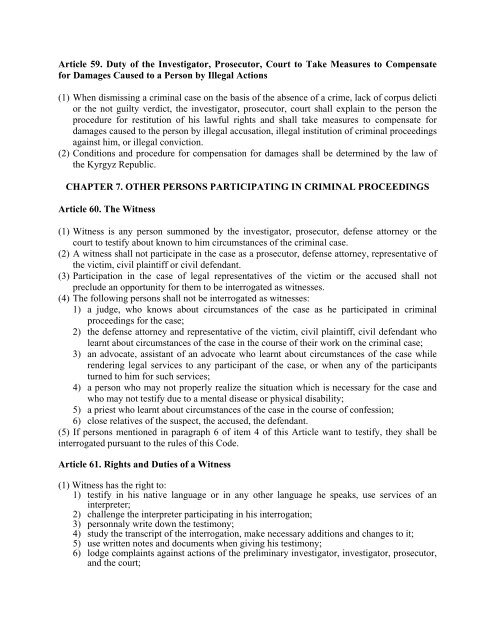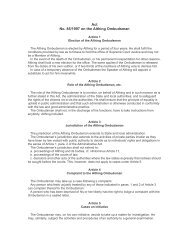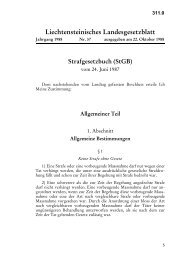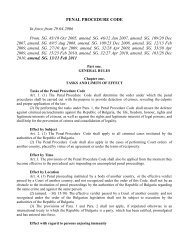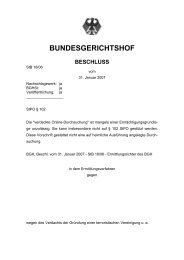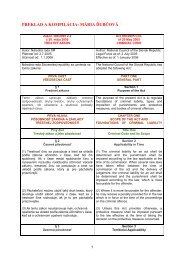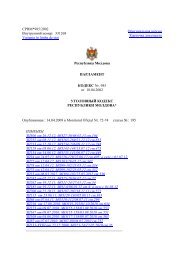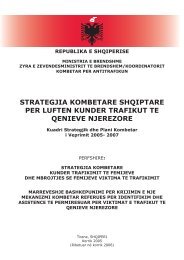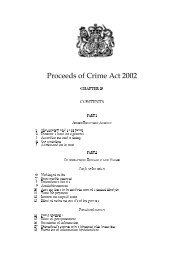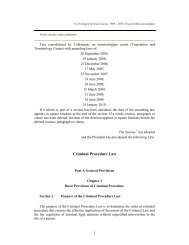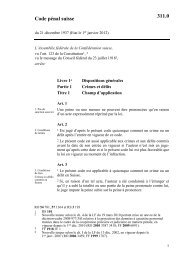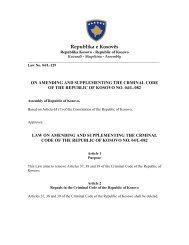Criminal Procedure Code of the Kyrgyz Republic - Legislationline
Criminal Procedure Code of the Kyrgyz Republic - Legislationline
Criminal Procedure Code of the Kyrgyz Republic - Legislationline
Create successful ePaper yourself
Turn your PDF publications into a flip-book with our unique Google optimized e-Paper software.
Article 59. Duty <strong>of</strong> <strong>the</strong> Investigator, Prosecutor, Court to Take Measures to Compensate<br />
for Damages Caused to a Person by Illegal Actions<br />
(1) When dismissing a criminal case on <strong>the</strong> basis <strong>of</strong> <strong>the</strong> absence <strong>of</strong> a crime, lack <strong>of</strong> corpus delicti<br />
or <strong>the</strong> not guilty verdict, <strong>the</strong> investigator, prosecutor, court shall explain to <strong>the</strong> person <strong>the</strong><br />
procedure for restitution <strong>of</strong> his lawful rights and shall take measures to compensate for<br />
damages caused to <strong>the</strong> person by illegal accusation, illegal institution <strong>of</strong> criminal proceedings<br />
against him, or illegal conviction.<br />
(2) Conditions and procedure for compensation for damages shall be determined by <strong>the</strong> law <strong>of</strong><br />
<strong>the</strong> <strong>Kyrgyz</strong> <strong>Republic</strong>.<br />
CHAPTER 7. OTHER PERSONS PARTICIPATING IN CRIMINAL PROCEEDINGS<br />
Article 60. The Witness<br />
(1) Witness is any person summoned by <strong>the</strong> investigator, prosecutor, defense attorney or <strong>the</strong><br />
court to testify about known to him circumstances <strong>of</strong> <strong>the</strong> criminal case.<br />
(2) A witness shall not participate in <strong>the</strong> case as a prosecutor, defense attorney, representative <strong>of</strong><br />
<strong>the</strong> victim, civil plaintiff or civil defendant.<br />
(3) Participation in <strong>the</strong> case <strong>of</strong> legal representatives <strong>of</strong> <strong>the</strong> victim or <strong>the</strong> accused shall not<br />
preclude an opportunity for <strong>the</strong>m to be interrogated as witnesses.<br />
(4) The following persons shall not be interrogated as witnesses:<br />
1) a judge, who knows about circumstances <strong>of</strong> <strong>the</strong> case as he participated in criminal<br />
proceedings for <strong>the</strong> case;<br />
2) <strong>the</strong> defense attorney and representative <strong>of</strong> <strong>the</strong> victim, civil plaintiff, civil defendant who<br />
learnt about circumstances <strong>of</strong> <strong>the</strong> case in <strong>the</strong> course <strong>of</strong> <strong>the</strong>ir work on <strong>the</strong> criminal case;<br />
3) an advocate, assistant <strong>of</strong> an advocate who learnt about circumstances <strong>of</strong> <strong>the</strong> case while<br />
rendering legal services to any participant <strong>of</strong> <strong>the</strong> case, or when any <strong>of</strong> <strong>the</strong> participants<br />
turned to him for such services;<br />
4) a person who may not properly realize <strong>the</strong> situation which is necessary for <strong>the</strong> case and<br />
who may not testify due to a mental disease or physical disability;<br />
5) a priest who learnt about circumstances <strong>of</strong> <strong>the</strong> case in <strong>the</strong> course <strong>of</strong> confession;<br />
6) close relatives <strong>of</strong> <strong>the</strong> suspect, <strong>the</strong> accused, <strong>the</strong> defendant.<br />
(5) If persons mentioned in paragraph 6 <strong>of</strong> item 4 <strong>of</strong> this Article want to testify, <strong>the</strong>y shall be<br />
interrogated pursuant to <strong>the</strong> rules <strong>of</strong> this <strong>Code</strong>.<br />
Article 61. Rights and Duties <strong>of</strong> a Witness<br />
(1) Witness has <strong>the</strong> right to:<br />
1) testify in his native language or in any o<strong>the</strong>r language he speaks, use services <strong>of</strong> an<br />
interpreter;<br />
2) challenge <strong>the</strong> interpreter participating in his interrogation;<br />
3) personnaly write down <strong>the</strong> testimony;<br />
4) study <strong>the</strong> transcript <strong>of</strong> <strong>the</strong> interrogation, make necessary additions and changes to it;<br />
5) use written notes and documents when giving his testimony;<br />
6) lodge complaints against actions <strong>of</strong> <strong>the</strong> preliminary investigator, investigator, prosecutor,<br />
and <strong>the</strong> court;


